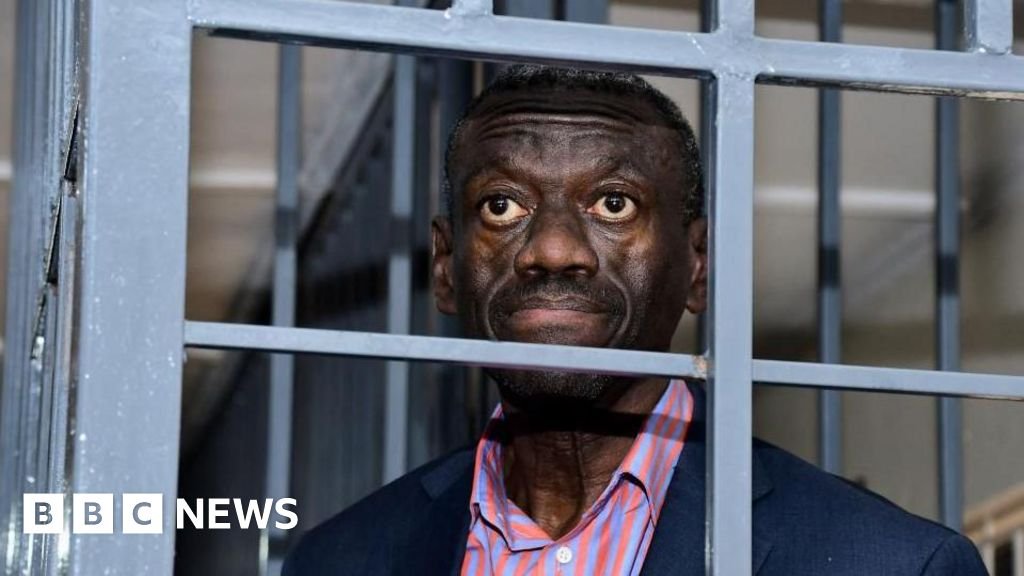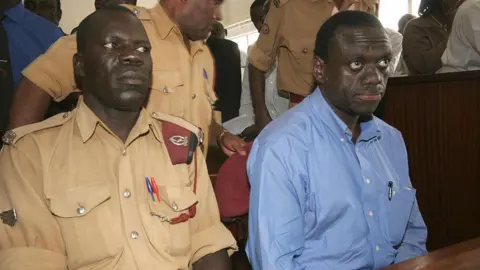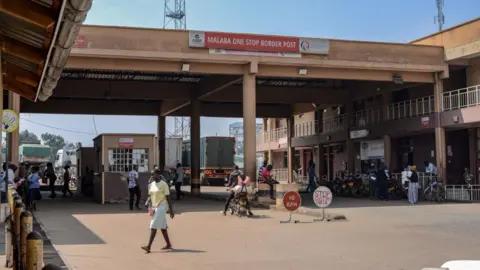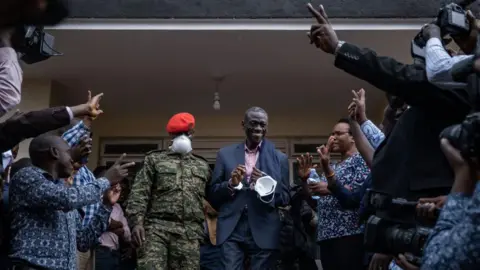Physical Address
304 North Cardinal St.
Dorchester Center, MA 02124
Physical Address
304 North Cardinal St.
Dorchester Center, MA 02124

 Reuters
ReutersThe mysterious detention of Ugandan opposition leader Keiza Besigye during a visit to Kenya nearly two weeks ago has sparked widespread condemnation and concerns over secret intelligence sharing between the two neighbours.
Besigye’s allies and wife have revealed disturbing details of how the opposition chief was apparently lured to meet his kidnappers, who were said to be masquerading as Kenyan security agents.
Reports say he was spied on from the moment he boarded a plane at Entebbe Airport in Uganda to the Kenyan capital, Nairobi, where he was picked up and then somehow transferred to a military court at home without extradition procedures.
Although Kenya insists it had no role and is investigating the incident, Uganda believes Kenya was fully aware of the plan, citing intelligence correspondence aimed at tracking down Besigye.
As he is due to return to court-martial in Kampala, we summarize what we know so far.
Besigye has contested and lost four presidential elections against President Yoweri Museveni, who has been in power since 1986.
He has recently been less active in politics and did not participate in the 2021 elections.
But earlier this year he launched a new party, the People’s Freedom Front (PFF), after breaking away from the Forum for Democratic Change (FDC), which he founded two decades ago.
The opposition politician has traveled to Kenya and moved freely for years, sometimes to attend high-profile events, even as he remains Museveni’s main rival and biggest critic.
This time, Besigye traveled to Nairobi to attend a book launch by Kenyan opposition politician Martha Karua.
The 68-year-old landed in the city on the morning of November 16 and took a taxi to his hotel in the affluent suburb of Hurlingham. He was accompanied by longtime ally Hajj Obeid Lutale.
Hours later, he left the hotel, got into a taxi and headed to Riverside Drive, about 5 km (three miles) from his hotel, for a private meeting, according to his political allies.
This was the last time he was seen until he reappeared in Uganda four days later.
 AFP
AFPHis taxi driver said he waited for the veteran politician for more than 12 hours before deciding to leave when he was unable to call him.
Besigye’s team in Uganda began relaying emergency calls after their leader’s cellphones went unanswered.
His disappearance made headlines and raised eyebrows in the region, with his wife, Winnie Byanyima, the head of the UN’s HIV and AIDS organization, reporting on social media that her husband had been “kidnapped” in Nairobi.
The next day, his reserved seat at the book launch, where he was scheduled to be a guest speaker, remained empty as organizers raised the alarm about his absence.
Besigye and his friend Lutale arrived at an apartment along Riverside Drive where he was to meet an unidentified Ugandan national and another unidentified British national, according to Byanima.
The British citizen allegedly wanted to introduce Besigye to a group of colleagues and businessmen who had expressed interest in financially supporting the PFF, she said.
In the room there was a box with money storage. One of the owners had two guns.
Shortly after the brief introduction, eight men in plain clothes who said they were Kenyan policemen knocked on the door and told Besigye and his associate that they were under arrest, Byanima told Kenya’s Citizen TV.
The opposition leader tried to explain that he had nothing to do with the items in the room, but the security staff did not listen.
Four of the men packed Besigye and Lutale into a car with Kenyan license plates and drove them to the Ugandan border under the cover of night.
“It was clearly a well-planned operation,” Byanima added.
 AFP
AFPBefore crossing into Uganda, the four men stopped speaking Swahili and began speaking the Ugandan languages of Luganda and Runyankola.
The two captives were flown to Uganda without their belongings, including their passports, which were later retrieved from a Nairobi hotel by Besigye’s party officials.
PFF spokesperson Ibrahim Semudju Nganda told Uganda Monitor that Besigye and his friend passed through the Malaba border crossing without stopping for routine security checks.
“They only changed vehicles. The four-wheel drive vehicle with a Kenyan license plate was left at the Malaba border crossing and transferred to another vehicle with (a) Ugandan license plate,” he said.
Ugandan Information Minister Chris Bariomunsi said detectives had gathered enough intelligence to arrest Besigye while in Nairobi.
He said Kenyan authorities had allowed the cross-border operation to take place, although officials in Nairobi insisted they knew nothing about it.
Besigye is now on trial in Kampala, not Nairobi, because the planned crime was “against Uganda, not Kenya,” Ugandan army spokesman Brigadier General Felix Kulaigye said. told the BBC’s Africa Daily.
“We have a legal framework with our counterparts in Kenya to deal with issues that threaten regional security,” he added.
He did not explain why there was no extradition process.
Reports suggest that Besigye’s arrest was planned for months and carried out with the help of some people close to him.
The organizers of the meeting are said to be a British national and a high-ranking Ugandan army official, both of whom were well known to Besigye, Ugandan media reported.
His wife claimed that the British national who attended the meeting was a “salaried operative who tried to plant weapons” on Besigye.
For decades, hundreds of civilians have been tried in Uganda’s military courts, although the Constitutional Court has ruled against the practice.
Besigye, no stranger to appearing in military courts, is back there because he submitted to military law, Brig Coulaigye told the BBC.
He and his co-accused were arraigned in a Makindye military court last week after being held incommunicado for four days.
They face four charges, including the discovery of two pistols and ammunition, as well as trying to buy weapons from foreigners in the Swiss city of Geneva, the Greek capital Athens and Nairobi.
Both denied all charges.
 AFP
AFPBesigye opposed being tried by a military court, saying he should be tried in a civilian court if charged.
His lawyers also argued that the alleged offenses were committed outside Uganda and that they were therefore wrongfully court-martialed.
However, the court dismissed the lawyers and allowed the hearing to continue.
The defendants were remanded in Luzira prison until December 2.
Ugandan lawyer and human rights activist Agatere Atuhaire told the BBC that Kenya should have arrested Besigye and extradited him to Uganda under the law governing the process.
Mrs Byanima said she did not expect her husband to get justice.
But Brig Coulaigier said the court-martial was “not a kangaroo court”.
“Justice will be served.”
Kenyan authorities have alternated between denying any knowledge of the operation and remaining silent, while Ugandan officials say much intelligence was shared between the two countries.
“The Ugandan government contacted the Kenyan government. Otherwise, how would you arrest someone in the middle of Nairobi and then bring them back to Uganda, either through the airport or by land, without the country’s full knowledge and support there in Kenya?” Information Minister Bariomunsi told Uganda’s NBS TV.
Many Kenyans are questioning the nature of the security ties between the two countries and whether it has been fully disclosed that Besigye will be tried in a military court.
Last Tuesday, Kenya’s acting foreign minister, Musalia Mudavadi, refrained from giving clear answers to reporters, pleading that his country should not be judged “too harshly”.
Mudavadi, who is also the acting home affairs minister, said Kenya was an open country that allowed “a lot of discretion”. But he warned foreigners not to cause a rift between Kenya and their home countries.
He said the Besigye issue would be resolved diplomatically, describing Uganda as Kenya’s “strong partner”.
Uganda’s admission that Kenya was involved in the kidnapping has caused a backlash against the Kenyan government both in Uganda and at home.
Some Ugandans have staged protests outside the Kenyan embassy in Kampala, while others have threatened to boycott Kenyan brands.
Besigye’s arrest follows a series of high-profile kidnappings and disappearances in Kenya, including the forced deportation of four Turkish refugees to Ankarawhere they faced charges of conspiracy against President Recep Tayyip Erdogan.
Additional reporting by Alan Kasujja
 Getty Images/BBC
Getty Images/BBC